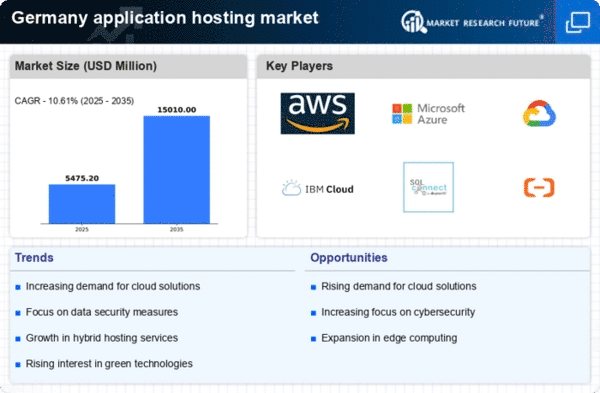Growing Emphasis on Cost Efficiency
Cost efficiency remains a critical driver for the application hosting market in Germany. Companies are increasingly seeking ways to optimize their IT expenditures while maintaining high service quality. The shift from traditional on-premises hosting to cloud-based solutions is indicative of this trend, as cloud services often provide a more economical alternative. Reports suggest that organizations can save up to 30% on IT costs by migrating to cloud hosting solutions. This financial incentive is compelling many businesses to explore application hosting market options that offer competitive pricing models and scalable resources, ultimately leading to a more sustainable operational framework.
Increased Focus on Regulatory Compliance
The application hosting market in Germany is significantly influenced by the stringent regulatory landscape, particularly concerning data protection and privacy. The implementation of the General Data Protection Regulation (GDPR) has heightened awareness among organizations regarding compliance requirements. As a result, businesses are prioritizing application hosting solutions that ensure adherence to these regulations. It is estimated that over 60% of companies in Germany are actively seeking hosting providers that can demonstrate compliance with GDPR and other relevant standards. This focus on regulatory compliance is driving demand for specialized application hosting services that offer robust security measures and transparent data handling practices.
Rising Adoption of Digital Transformation
The application hosting market in Germany is experiencing a notable surge due to the increasing adoption of digital transformation initiatives across various sectors. Organizations are recognizing the necessity of modernizing their IT infrastructure to enhance operational efficiency and customer engagement. As of 2025, approximately 70% of German enterprises are expected to have implemented some form of digital transformation strategy. This shift is driving demand for application hosting services that can support scalable and flexible solutions. The application hosting market is thus positioned to benefit from this trend, as businesses seek reliable platforms to host their applications, ensuring seamless integration with emerging technologies such as AI and IoT.
Expansion of E-commerce and Online Services
The application hosting market in Germany is benefiting from the rapid expansion of e-commerce and online services. As consumer behavior shifts towards digital platforms, businesses are increasingly investing in online presence to capture market share. The e-commerce sector in Germany is projected to grow by 15% annually, necessitating reliable application hosting solutions to support high traffic volumes and transaction security. This growth is prompting companies to seek application hosting market services that can provide the necessary infrastructure to handle increased demand, ensuring optimal performance and user experience. Consequently, the application hosting market is poised for growth as businesses adapt to the evolving digital landscape.
Technological Advancements in Hosting Solutions
Technological advancements are playing a pivotal role in shaping the application hosting market in Germany. Innovations such as containerization, microservices architecture, and serverless computing are revolutionizing how applications are hosted and managed. These technologies enable greater flexibility, scalability, and efficiency, allowing businesses to deploy applications more rapidly and respond to market changes effectively. As of 2025, it is anticipated that around 40% of new applications will be developed using these advanced hosting solutions. This trend indicates a shift towards more agile application hosting market services, which can accommodate the dynamic needs of modern enterprises.
















